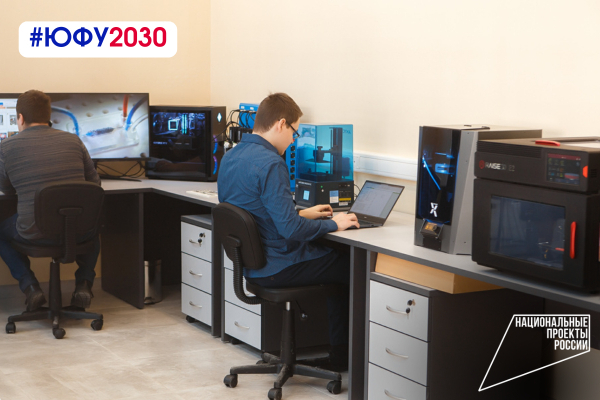
The SFedU Center for High-Tech Instrumentation presented a new remote control system for microfluidic synthesis called the Smart Laboratory. The development is aimed at accelerating the synthesis of strategically important materials.
Today, one of the key tasks of Russian science is the development of accelerated synthesis of strategically important functional materials necessary for the space, automotive, pharmaceutical and other industries. The team of the International Research Institute of Intelligent Materials and the Center for High-Tech Instrumentation is engaged in this area at the Southern Federal University.
For example, a laboratory controlled by artificial intelligence was created on the basis of the SFedU Moscow Institute of Physics and Technology. To create new materials, scientists set the necessary properties of the development — then all decisions are made by the microfluidic system itself. Such laboratories significantly speed up and simplify the work process, but it is too early to talk about full automation of scientific research. However, it has recently become possible to remotely control the work and monitor the laboratory in real time. This happened thanks to the collaboration of the staff of the SFedU Moscow Institute of Physics and Technology under the leadership of the head of the scientific direction "Materials Sciences and synchrotron-neutron Research", Doctor of Physico-Mathematical Sciences, Professor of SFedU Alexander Soldatov and the staff of the Institute of Computer Technology and Information Security of SFedU under the leadership of Associate Professor of the Department of Information Technology Security named after O.B. Makarevich SFedU Institute of Computer Technologies and Information Security Elena Basan.
As part of the collaboration, a multisensor was developed, combined with an Internet of Things controller [editor's note: a concept in which physical objects of everyday life are connected to a network using the Internet and exchange data with each other without the need for direct interaction with a person], as well as a web service for remote monitoring and management of a compact microfluidic system for accelerated synthesis of strategically important materials.

"The multisensor includes sensors for carbon dioxide, carbon monoxide, humidity, temperature, pressure, and the proportion of oxygen in the atmosphere, which allow you to analyze the state of the environment and make decisions about the situation in the laboratory. Also, along with the multisensor, an IP camera is integrated into the hardware and software complex, which allows you to monitor the work in the laboratory in real time," said Alexander Soldatov.
This system allows for continuous monitoring of the state of laboratory equipment and provides security for a heterogeneous computing network based on the Internet of Things concept.
In 2025, it is planned to modernize the infrastructure of the Laboratory of Additive Technologies (AT), integrate it into a web-based remote monitoring and management service, develop both additive technologies and microfluidic synthesis, as well as integrate with the university's data-based management platform. According to the scientists, integration of other university laboratories into a heterogeneous network is planned in the near future.
This development was carried out within the framework of the project "Research Laboratory of microfluidic technologies for accelerated synthesis of materials" within the framework of the strategic academic leadership program of SFedU "Priority 2030" (national project "Youth and Children").
Short link to this page sfedu.ru/news/77420




